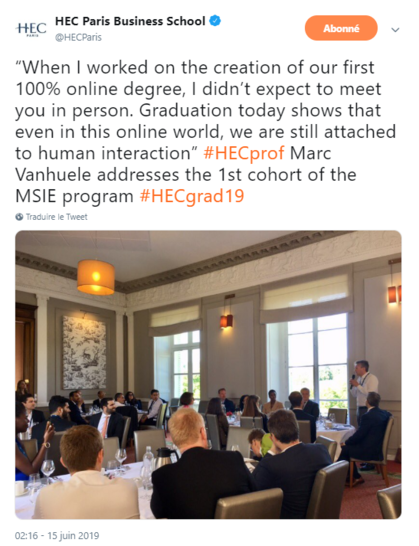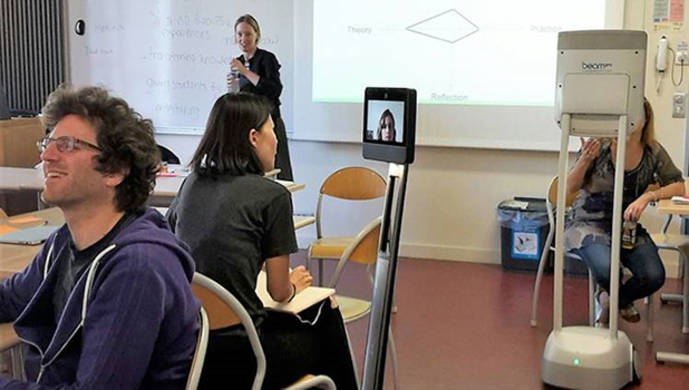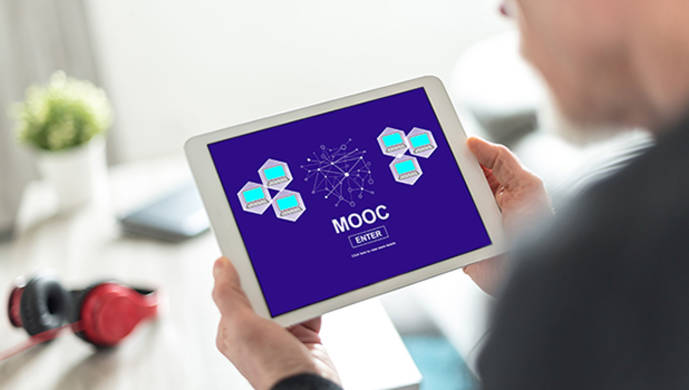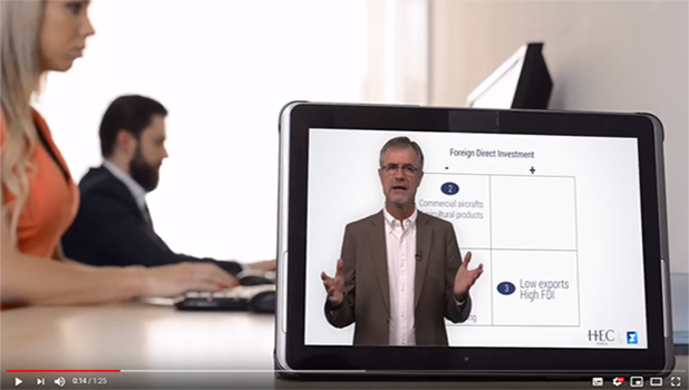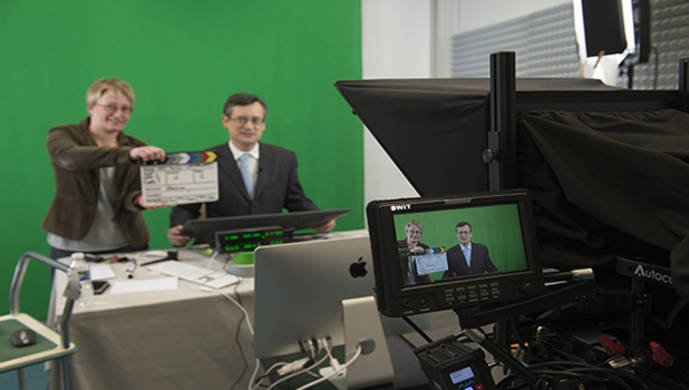The program takes 18 months to complete, consisting of 20 courses and a ten-month-long group project. It is structured in short phases that can be completed independently. This allows the participants to adjust their learning journey to their project and opt for a Certificate or an MSc degree that can be leveraged throughout their career. In June, the first two cohorts, 120 participants in total, received their degree.
What challenges did you have to face?
Vanessa Klein, Director Digital Learning at HEC Paris: When I was asked, with Associate Dean Marc Vanhuele, to explore the possibility of launching a fully online degree, our challenge was to come up with a formula that would assure that the online master would be considered of the same standing and quality as a traditional on-campus master’s program. After all, the graduates would become HEC alumni. How to make sure that they would be regarded as real alumni? Fortunately, we were given complete freedom for the design. We did not follow an existing model or template. We knew that we had the know-how to create online courses. The scale of creating 20 courses was quite daunting but the real challenge was that the sum of 20 MOOC-like courses would not be sufficient for a degree. The innovation project under the guidance of seasoned mentors from HEC’s ecosystem played a key role in making the difference.
How to make sure that the graduates would be regarded as real alumni?
Robin Ajdari, Chief Digital Officer at HEC Paris: MSIE was an enormous production challenge but everything was completed in time, thanks to the hard work of the team managed by Vanessa Klein and Ashraf Akbar. It was important to launch the program as fast as possible after we received the go-ahead from our governance. At the same time, it was key to maintain the quality standard that formed the basis of our MOOCs’ success. The program was launched in September 2017, and the first cohort of learners started when only six of the twenty courses were actually ready. The expression “flying an airplane while building it” is a very good description of the project. It all ended well but it has been a bumpy and stressful journey – we learned a lot!
A second challenge was that we work in partnership with Coursera. The program runs on their platform and we work together on marketing activities. This collaboration brings additional resources and expertise to the project. It is fantastic to be able to count on their contribution but the formula, of course, also creates complications. The platform keeps evolving constantly, whilst not always delivering the features we’re expecting.
The expression “flying an airplane while building it” is a very good description of the project.
Stéphanie Gaget, Business Development Manager at HEC Paris: An important challenge on the delivery side is finding the right balance between giving flexibility to our participants and making sure that they keep the cadence in order to reach the different deadlines and finish the program in time. That’s the problem with self-paced learning when the learners have a lot of other ongoing commitments. We initially gave too much flexibility and some participants could not keep up with their cohort and had to switch to the next one.
What explains the success of this online program?
According to Director Digital Learning Vanessa Klein, it is essential to have good coordination and a relationship of trust between the instructional designers, project managers and the professors.
Thomas Astebro, Academic Director of MSIE, L'Oreal Professor of Entrepreneurship and serial entrepreneur: The Master’s program teaches skills for innovation, so it focuses both on start-up enterprises and on innovation-based business development in larger firms. It trains individuals in a wide range of hard skills needed for entrepreneurship, and some behavioral skills such as persistence and negotiation...
Key to the success is that, like many of our programs at HEC Paris, this one is the result of the combined input from academic faculty and practicing entrepreneurs. Contributions come from business people such as Affiliate Professor Ambroise Huret, Managing Partner at strategy consulting firm Eleven, who shares his own vast experience as an entrepreneur and entrepreneurial dilemmas in the course on entrepreneurship strategy. We also have Pascale Brochard, a practicing intellectual property lawyer, and academic subject experts such as Associate Professor Mathis Schulte, who teaches negotiations skills in the program.
Key to the success is that, like many of our programs at HEC Paris, this one is the result of the combined input from academic faculty and practicing entrepreneurs.
Ashraf Akbar, Senior Digital Learning Manager & Instructional Designer: After leading the Online Master’s project for more than one year, I think that a key ingredient of our success is that we have very experienced faculty who delivered prime quality content and at the same time, we used our experience in online pedagogy to provide them with effective pedagogical design guidance. An online course has to follow the pedagogical as well as technical constraints imposed by the platform. These constraints sometimes create conflict with the pedagogical objectives and content requirements. A good course is not necessarily one that falls neatly into the limitations of a learning management system (or LMS) and that's why we had to think out of the box to come up with creative solutions that go beyond what the platform offers.
It is our responsibility as instructional designers to understand the technical limits and then find methods to operate within them while pushing the boundaries at the same time. We used immersive and engaging instructional design strategies including content chunking strategies and active learning, where we prepared learners to work individually as well as in teams.
We had to think out of the box to come up with creative solutions that go beyond what the platform offers.
Stéphanie Gaget: With the arrival of MSIE we have a new job at HEC, that of learning coach. The Learning Coaches are the guarantors of the smooth running of the courses and especially of the educational experience of the students throughout the program. The Learning Coaches are there to answer all the students' questions and to remind them of the deadlines and expectations of the program. Because online training can sometimes lead to fear of isolation, the Learning Coaches are in regular contact with the students. They build special relationships with them and support them in their educational journey to ensure the best possible learning experience. Learning Coaches also help to create links between students, by exercising the role of community manager, by informing students about the life of HEC alumni around the world, or by creating unifying events (virtual or face to face). Their role is essential to the cohesion of the virtual group and helps develop the feeling of belonging to the community of HEC. In addition, we have mentors who coach the group projects. Action-based learning, moving a project from ideation to the investors’ pitch is an essential feature of MSIE. The mentors themselves are coached by their own mentors.
The Learning Coaches are the guarantors of the smooth running of the courses and especially of the educational experience of the students.
Who likes MSIE and why?
The latest cohort consisted of more than 70 students, coming from more than 30 countries and nationalities. The most striking characteristic of this new group of participants is that their ages vary widely. The youngest participant was 25 years old. The oldest 61. With an average age of 38, many are mid-career executives who want to transition into leadership in their organizations. But there are also several students in their twenties who wish to build their own businesses. The sixty-plus veterans have the ambition to provide a framework for their own experience in order to pass on knowledge and skills to younger people.
Students have diverse professional and academic backgrounds (marketing, research and development, military, communication…). For example, Efthymia Lioliou, postdoctoral researcher in Biochemistry from Greece, decided to apply for the MSIE because she wanted to play an active role in solving pressing societal, environmental and health-related issues: “My project aimed at producing protein biotechnologically in order to feed the Earth’s growing population in a sustainable way. I would recommend MSIE without hesitating – producing a team-project while working from distance was one of the most innovative and interesting, thought-provoking aspects of the degree.”
See on Twitter here.

